Israeli Public Is Concerned Over Budget Priorities as the War Continues
Public Opinion Survey on Economic Issues
This survey was conducted in order to assess public opinion regarding the preferred economic policy in light of the war in Gaza, to identify the main areas of concern to the public, and to examine the public’s views on various social issues.

Photo by Michael Giladi/Flash90
This survey was conducted in order to assess public opinion regarding the preferred economic policy in light of the war in Gaza, to identify the main areas of concern to the public, and to examine the public’s views on various social issues.
The survey was carried out with a representative sample of 1,000 men and women, who were interviewed via the internet and by telephone[1] between December 7 and December 24, 2023. The sample comprised 800 Hebrew speakers and 200 Arabic speakers, constituting a nationally representative sample of the adult population in Israel (aged 18 and above).
In constructing the sample, an effort was made to repeat questions asked in previous surveys, so as to identify changes in public opinion regarding key issues.[2]
In response to the question “To what extent are you satisfied with the economic situation in Israel?”, half the respondents (50%) said that they are not satisfied, including 21% who reported that they are not satisfied at all. Meanwhile, 30% gave a score of 3 out of 5, and only 20% said they are satisfied with the economic situation in Israel.[3] The average score given was 2.5, reflecting dissatisfaction with the current situation.
Asked to rate their satisfaction with public services on a scale of 1-5 (1 is least satisfied and 5 is most satisfied), 39% of Israelis gave a rating of 1 or 2, indicating they are not satisfied. By contrast, 22% gave a rating of 4 or 5, indicating they are satisfied, and 39% gave the middle-rating of 3.
In your personal experience, to what extent are you satisfied with the public services you currently receive in practice from the state? (interviewees who provided a response;[4] %)
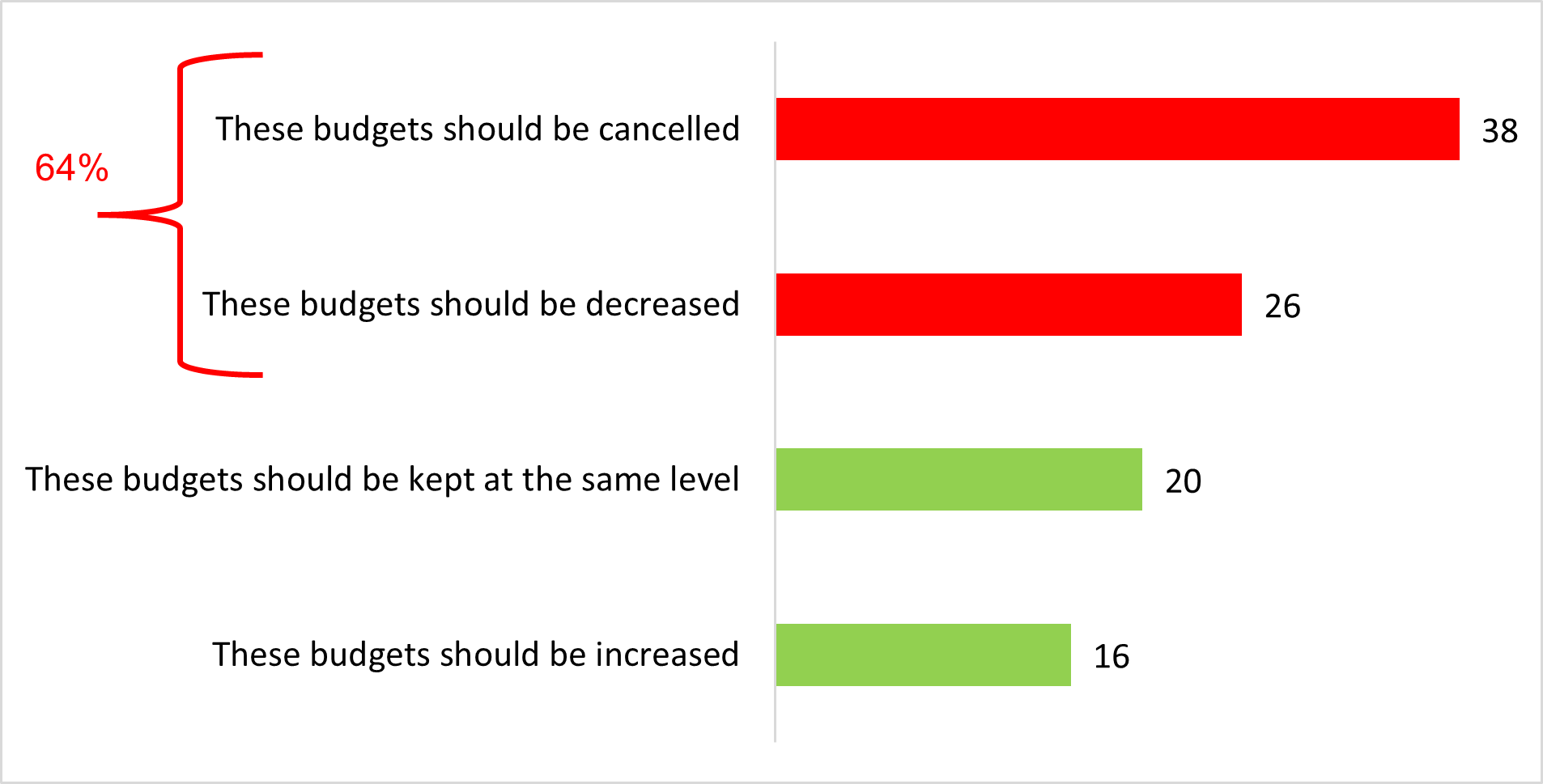
The share of the public who say they are not satisfied with the public services they receive is larger among Jews (41%) than among Arabs (29%), a difference of around 12 percentage points. Accordingly, a much larger proportion of Arabs than of Jews are satisfied with the public services they receive, by a difference of 21 percentage points. The average rating for satisfaction with public services received stands at 2.6 among Jews and 3.1 among Arabs.
In your personal experience, to what extent are you satisfied with the public services you currently receive in practice from the state? (Jewish and Arab samples; %)
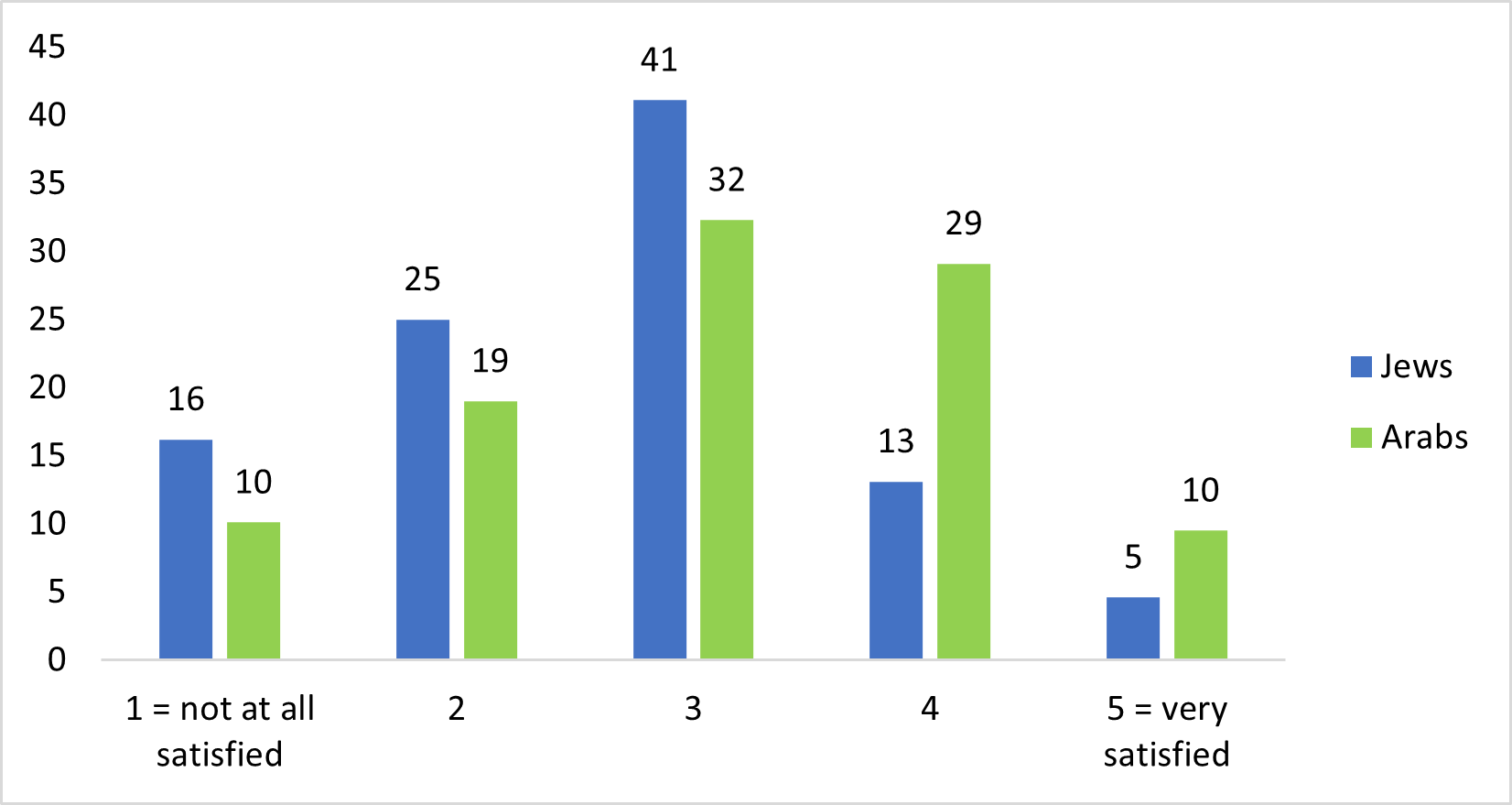
A breakdown of responses to this question by sex did not find any significant differences. Analysis by income reveals that interviewees with below-average incomes (less than NIS 10,000 per month) are more satisfied with the public services they receive, giving an average rating of 3. This is in contrast to an average rating of 2.7 given by those with average incomes (NIS 10,000–15,000 per month) or above-average incomes (over NIS 15,000).
Satisfaction with public services declines with age: From an average score of 3 in the 18–24 age group, reported satisfaction steadily decreases to an average score of 2.5 in the 45–54 age bracket, though it then rebounds to 2.7 above the age of 55. This finding is similar to that regarding satisfaction with one’s personal economic situation.
In your personal experience, to what extent are you satisfied with the public services you currently receive in practice from the state? (total sample, by age group; average score) [red line shows overall mean score]
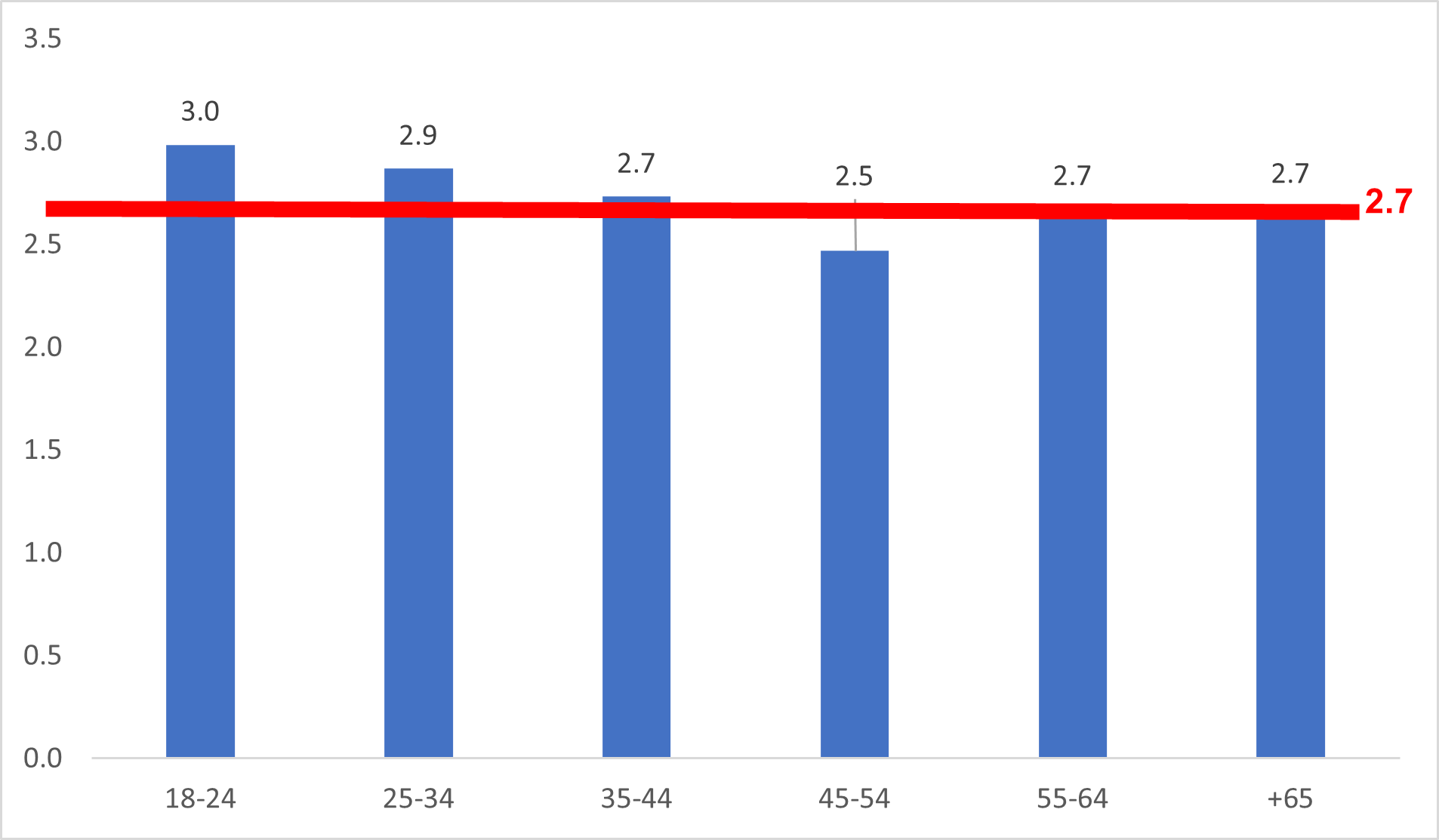
The interviewees were first presented with the priorities contained in the 2023 budget, prior to the amendments resulting from the war in Gaza—that is, the distribution of the state budget among different policy areas, as approved in March 2023. Then, they were asked the following question: “If it was up to you, for which two areas would you recommend increasing the government budget allocated to them?”[5]
The areas for which there is strongest public support for increasing budget allocations are health (42% of respondents), defense (37%), and education (37%).
Comparing the current results with public preferences as found by a survey conducted by the Israel Democracy Institute in 2022, we find that there has been an increase in the importance attributed by the public to the health and defense budgets: Since 2022, the share of respondents who think that the defense budget should be increased has grown by 11 percentage points, and the share who think that the health budget should be enlarged has risen by 6 percentage points. This change in priorities is hardly surprising given the crises of recent years—the COVID pandemic and the war in Gaza.
By contrast, the share of interviewees who think that the budget for addressing housing issues should be increased has fallen by 8 percentage points, while the proportion of those in favor of increasing the budgets for education, welfare, and transport has declined by 5, 4, and 4 percentage points, respectively.
If it was up to you, for which two areas would you recommend increasing the government budget given to them? December 2023 (total sample; %) [percentage of 2023 budget for each area shown in parentheses]
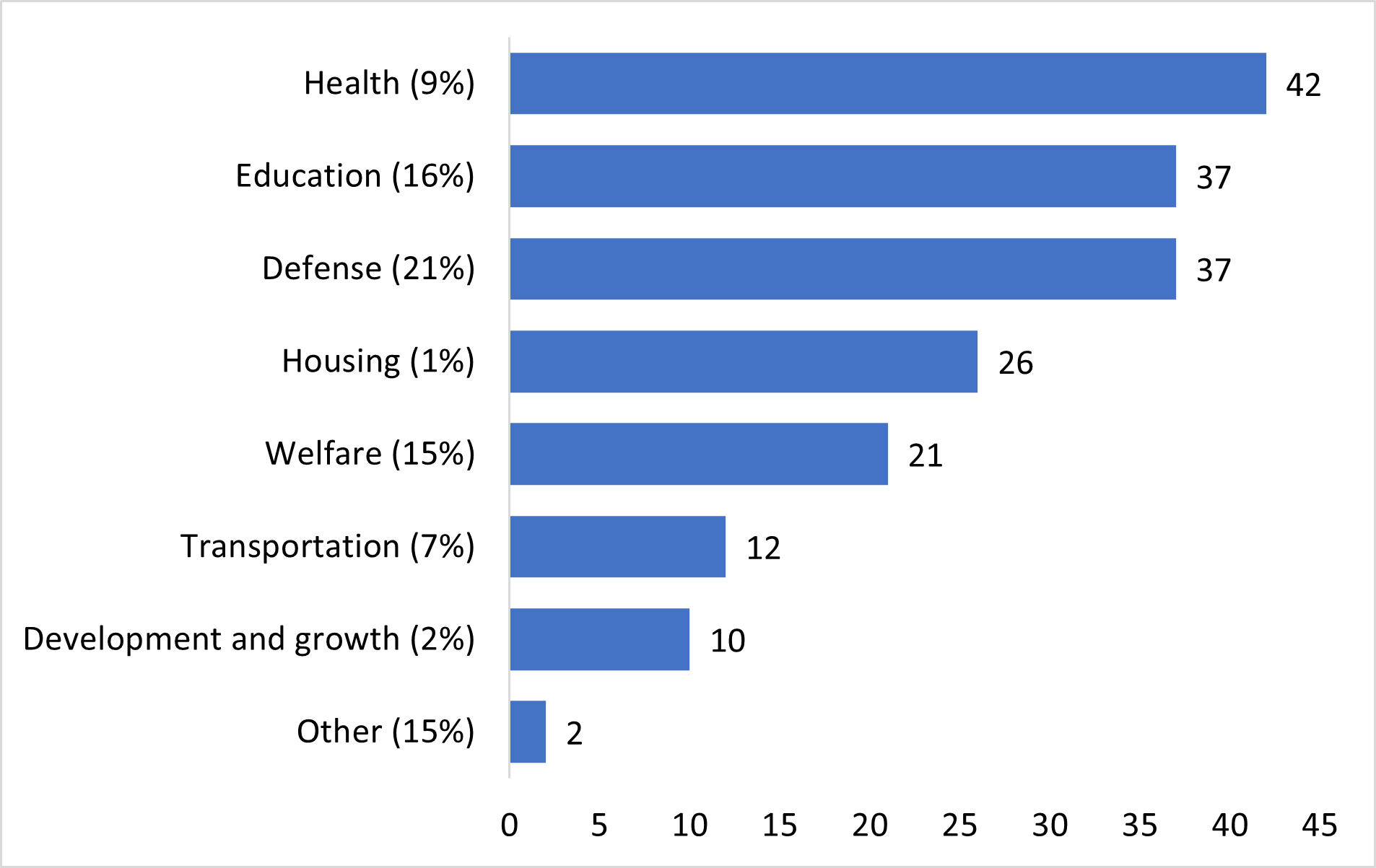
If it was up to you, for which two areas would you recommend increasing the government budget given to them? Percent point change between May 2022 and December 2023 (total sample; %)
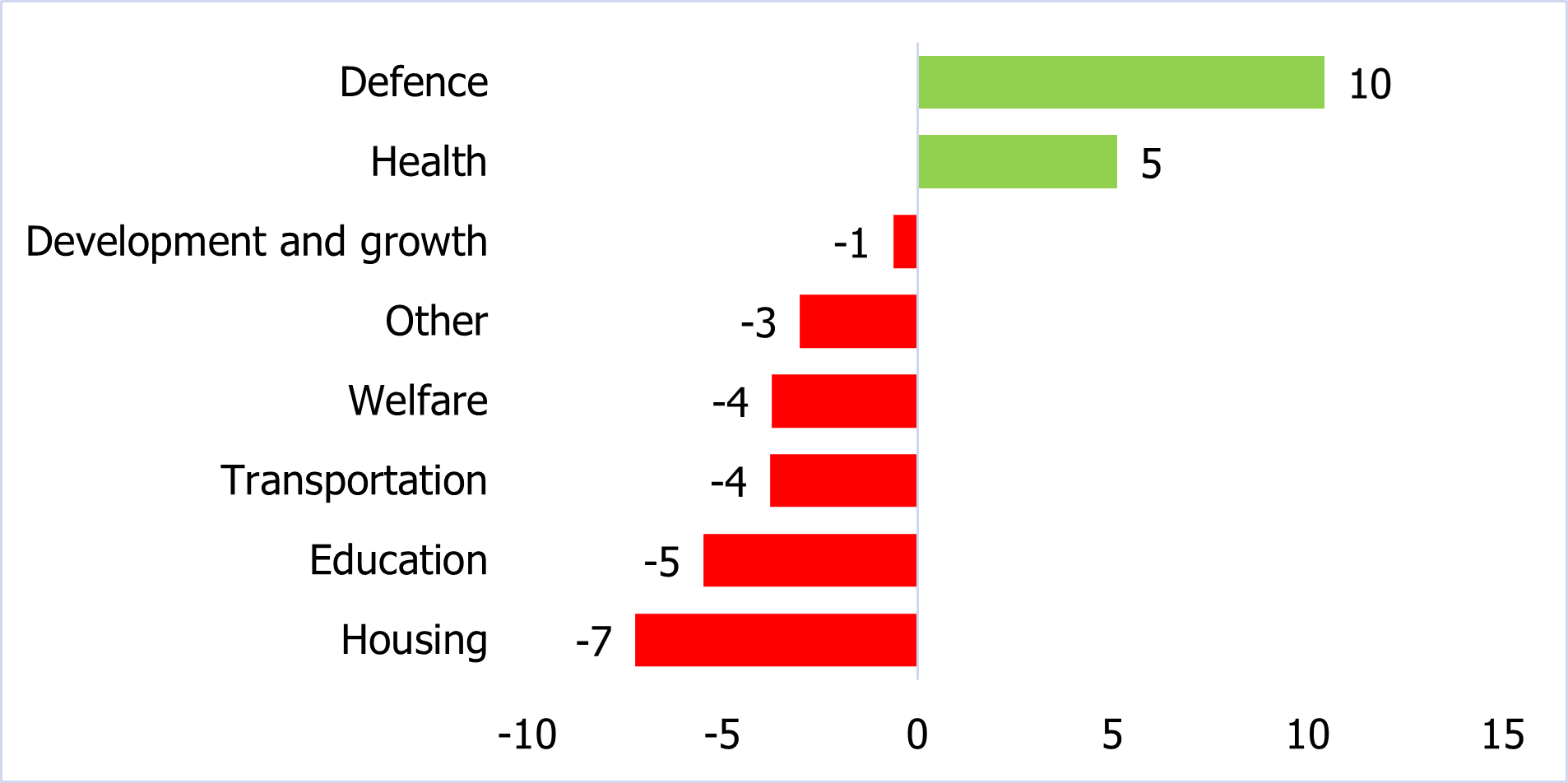
In addition, the respondents were asked what they think should be done regarding the coalitionary budgets that were signed as part of the 2023–2024 state budget, given that circumstances have changed significantly since then. A large proportion of the total sample (22%) selected the “don’t know” response, as did an even larger share of the Arab sample (37%). This may reflect a lack of understanding on the part of the public of this complex issue.
Of those who did respond to the question, 63% think that the coalitionary budgets agreed as part of the 2023–2024 budget should be cancelled or cut in light of the change in circumstances (38% say that these budgets should be scrapped, and the remaining 25%, that they should be cut).
On the other hand, 37% think that the coalitionary budgets should be either retained at the same level agreed (20%) or increased (17%).
Regarding the coalition agreements that were signed as part of the 2023–2024 budget, and given/despite the fact that circumstances have changed since then, which of the following best describes what you think should be done now with these budgets? (total sample; %)

In another question, we asked: “How should the government fund the expected increase in the state budget for 2024, due to the costs of the war?” The majority of respondents (69%) said that “the coalitionary agreement budgets should be cut and superfluous ministries should be closed, and the rest of the budget should be cut according to the government’s discretion, in order to prevent an increase in the national debt.” Around 13% think that the costs of the war should be funded by cutting the coalitionary budgets, increasing the national debt, and increasing taxes in the future. A further 10% support funding the war by increasing the national debt and raising taxation, and 7.5% are in favor of budget cuts and higher taxation in the 2024 budget in order prevent an increase in the national debt.
How should the government fund the expected increase in the state budget for 2024, due to the costs of the war? (total sample; %)
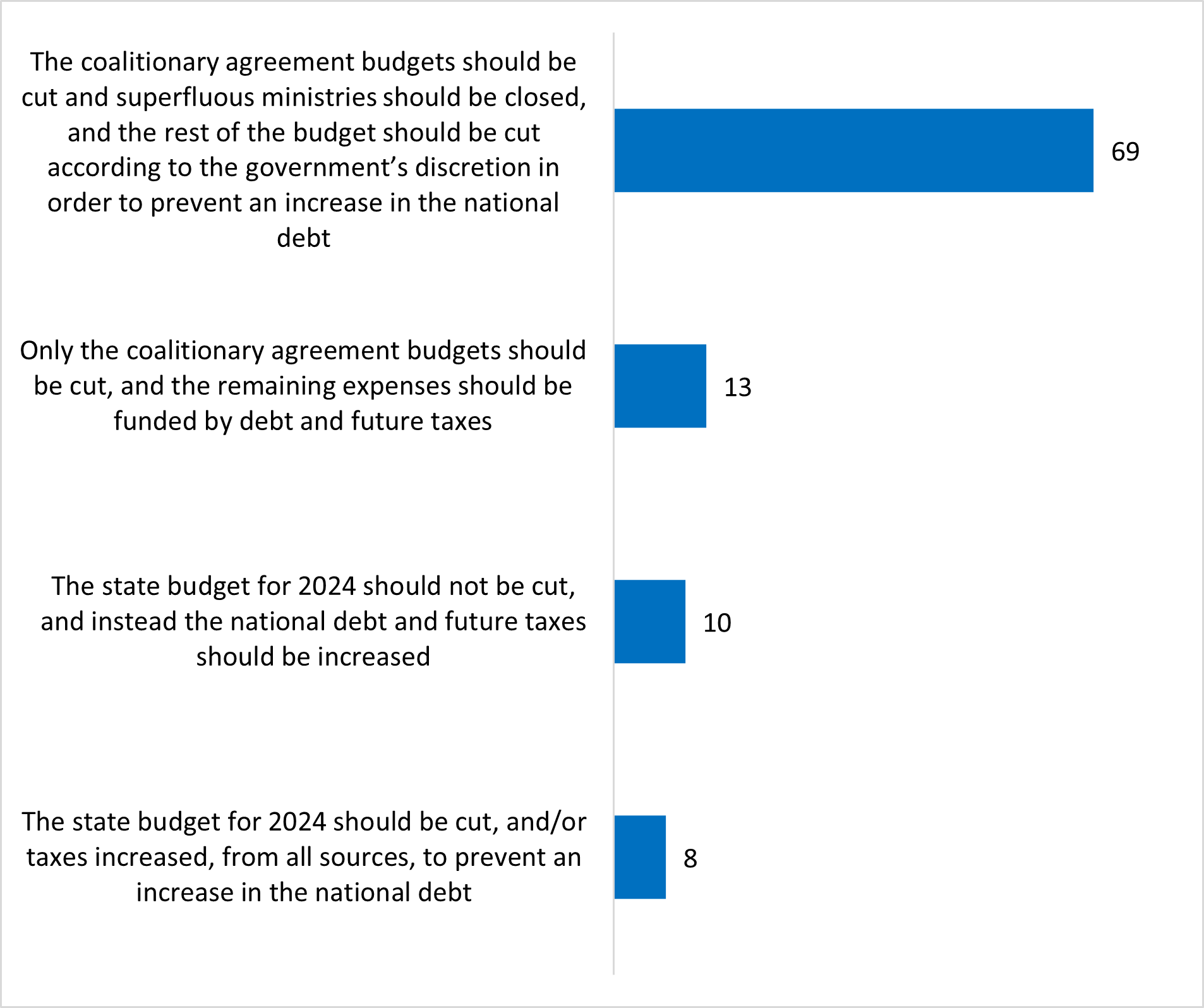
The survey found that the issue that worries the public most in the short term (the coming year) is the security situation: 53% cited this as a source of concern, compared with 46% in a similar survey held in May 2022.[6] This rise is hardly surprising in the wake of the October 7 attacks and the war in Gaza. A larger share of women is worried about the security situation in the short term (59%) than of men (46%), as is a higher proportion of Jews (57%) than of Arabs (35%).
The second most worrying issue for the public in the short term is the high cost of living and housing prices (36%). The share of the Arab public worried about this issue (50%) is larger than the equivalent share of the Jewish public (31%).
Next in the rankings of issues of concern in the short term are the economic situation (30%) and the functioning of the government (28%). The proportion of Jews who are worried about the functioning of the government (32%) is much larger than that of Arabs (just 8%), while a larger share of Arabs is worried about the economic situation (43%) than of Jews (27%).
Personal security is also a concern for the Israeli public, and in particular, for Arab society: 26% of Arabs cited this issue as a major worry in the short term, as did 16% of Jewish respondents.
What are the two main issues that worry you most in the short term (the coming year)? (total sample; %) [Respondents were able to select more than one option]
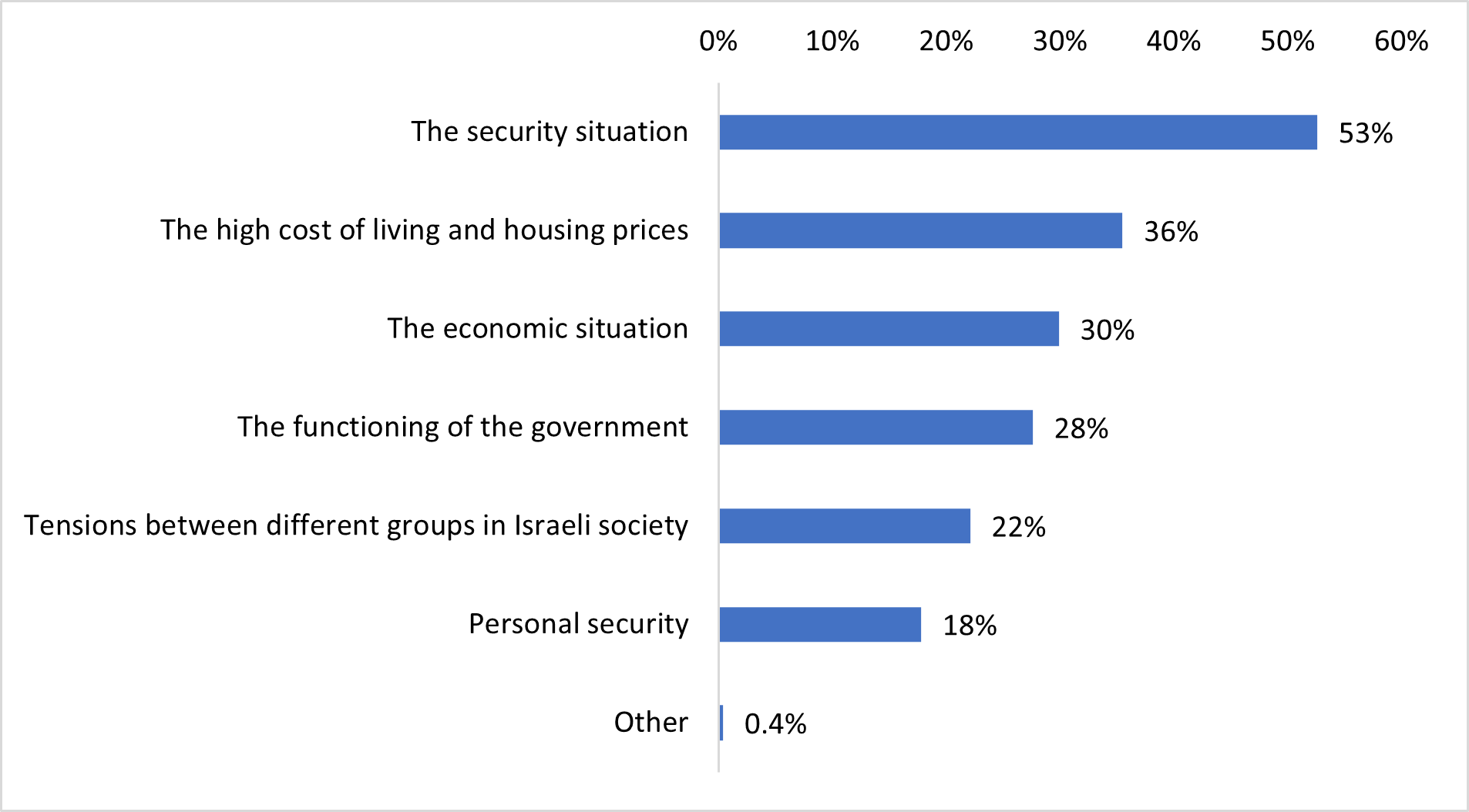
The respondents were asked to grade government policy in a number of areas that are relevant to the current circumstances, on a scale from 1 = fail to 5 = excellent.
The average grade given to the government was below 3 in most areas—that is, in the lower section of the range from 1 to 5. The lowest grade (2.5) was for the government’s policy in the fields of welfare services for individuals, personal security, and economic support for population groups negatively affected by the war. Presumably, the link between these low scores and the functioning of the government (or lack of functioning) during the weeks following the October 7 attacks is obvious to readers.
Respondents also gave a low grade (2.6) to government policy on providing responses for population groups negatively affected by the war and in the area of education. Transportation, which received a slightly higher score of 2.7, was also graded below 3, which is the mid-point between 1 and 5.
The exception was health—the only area to receive a grade of 3, representing a rating of “so-so.”
Average grades given to government policy in different areas (total sample)
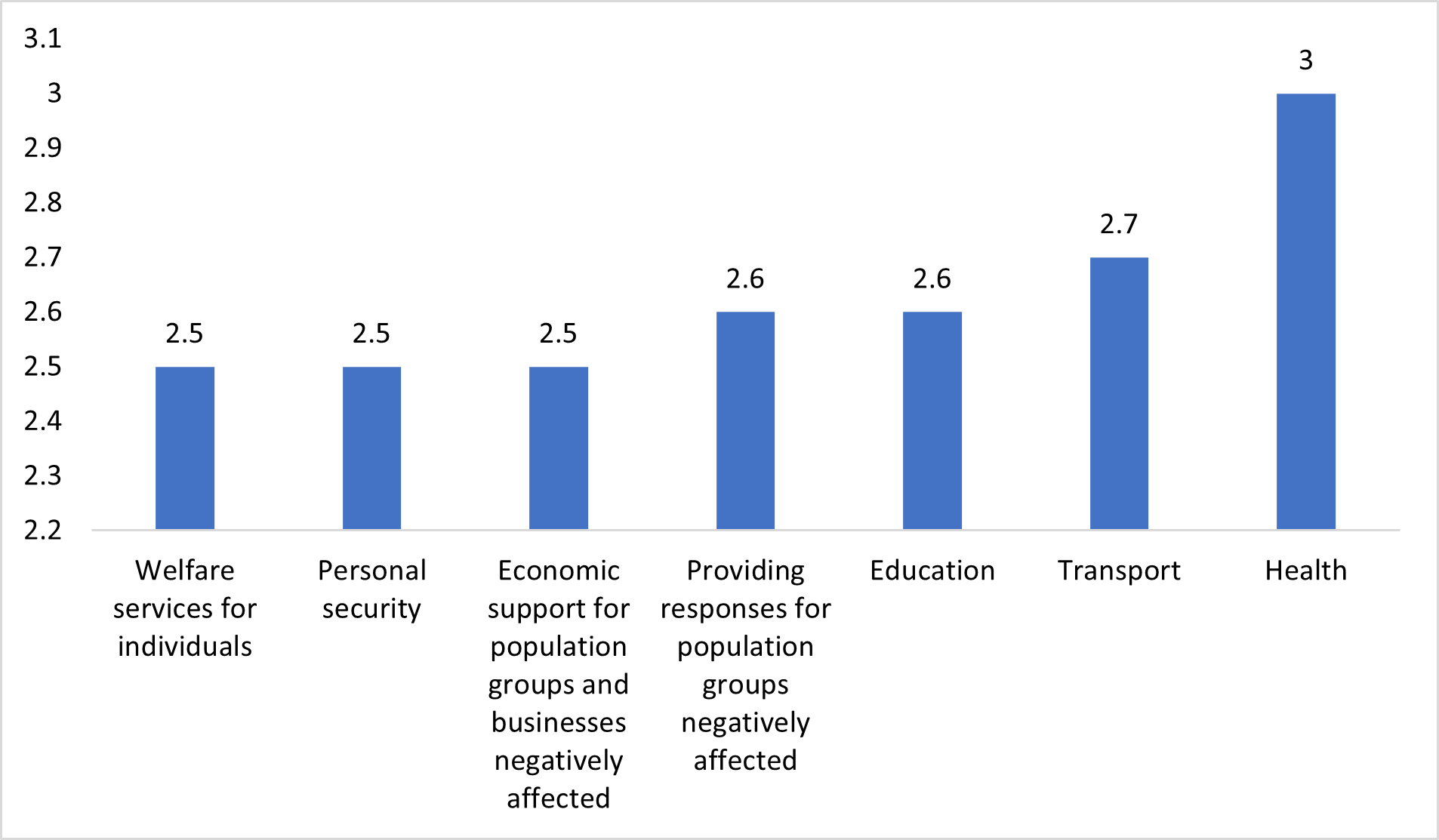
[1] Telephone interviews were conducted to include population groups that are under-represented on the internet.
[2] The authors express their thanks to the staff of the Viterbi Family Center for Public Opinion and Policy Research at the Israel Democracy Institute, for their helpful comments.
[3] The findings presented exclude those who declined to answer the question or said they don’t know, representing around 5% of the total sample. In the Arab sample, this group (decline to respond or don’t know) constituted 13% of respondents.
[4] The findings presented exclude those who declined to answer the question or said they don’t know.
[5] In addition to the areas shown on the figure presented here, the interviewees were also offered the response “debt repayment” as an option for increasing or reducing the budget. However, when we examined the reliability of the responses and the quality of the questionnaire, we found that the wording of this question was not sufficiently clear, and that it is possible that some respondents who selected “debt repayment” on the question about reducing the budget meant that the debt should be reduced, rather than the debt repayment. Because those who support reducing the debt actually support increasing the size of debt payments, presenting this option turned out to be uninformative, and selections of this option were excluded from the final analysis.
[6] Though the issues presented to the public in the earlier survey were not identical to those offered in this survey, we consider the comparison between the two sets of findings to be valid.
